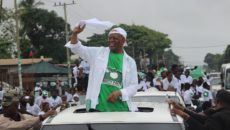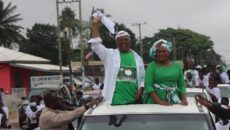As Charles Taylor’s rebels gained ground on government forces in Liberia, stories of Mandingos — a predominantly Muslim ethnic group — being massacred and mosques across Liberia burnt to ashes unfurled. Muslims around the country became a target. Well-meaning Liberians with Islamic names quickly changed their names out of fear.
An entire religion was targeted as the result of a few high-profile individuals’ coziness with the ruling government of President Samuel Doe. Towns occupied by Mandingos were completely wiped out by rebel forces; this was one of the most under-reported ethnic cleansing atrocities in the Liberian civil war.
Mandingo families in Lofa struggling to escape to neighboring Guinea with their children witnessed the corpses of other Mandingos being spat on and dragged in the streets as illiterate, cross-dressing rebels called them “traitors and foreigners.”
Traitors and foreigners — the words mostly used by rebel forces to justify the killing of Muslims during the Liberian civil war. These words weren’t concocted by those cross-dressing, illiterate rebels who could barely complete a sentence in English. This phrase had to be the making of the so-called intellectual elites of Liberia who backed the rebel invasion to oust president Samuel Doe.
Not only were Muslims called traitors and foreigners, they were actually called “enemies of Liberia” by a senator at the time.
Ancient history? Water under the bridge? Not so fast. While time has passed, a recent discovery of a letter written by then-president Charles Taylor sheds some light on one of this year’s current presidential candidates.
In the letter, Taylor apologizes to Liberia’s Muslim community for an anti-Muslim comment made by then-senator Charles Brumskine — a candidate in the 2017 Liberian presidential election.
According to a newspaper report from the time, Brumskine had called Muslims â€enemies of Liberia.†Ironically, this statement was so vile that Taylor, the man who led the ethnic cleansing of Mandingos and Muslims, had to apologize to the Muslim community on behalf of the government of Liberia for Brumskine’s anti-Muslim comment.
On countless occasions, Charles Brumskine has had to defend himself against allegations of being a tribalist, an elitist, and one who stokes the age-old division between the Americo-Liberians and the indigenous. The recent documented evidence outlining one of his many divisive comments cements the allegations against him.
Charles Brumskine has proven to be a man who uses divisive tactics for his political advantage, a man that believes a peaceful religion is an enemy of the state, a man whose words were so vile that a monster felt the need to apologize to the community that he himself had committed war crimes against. Tribalist, elitist, and divisive tactics are not leadership. They are deadly.
The Marks of a True Leader
It’s easy to be a bad leader as evidenced by the likes of Brumskine and countless other corrupt politicians in Liberia and around the world. True leaders are a unique breed with character traits that lend themselves to serving the greater good.
Below are the marks of a true leader:
-          Humility — True leaders are humble. They realize that their way is not necessarily the best or only way. Thus, they seek other opinions — including opinions that might be polar opposites of what they believe — with an open mind.
-          Purpose — True leaders have a strong sense of purpose. They know who they are and what they stand for. And while they have the humility to seek other opinions, they also have the moral courage to stay true to themselves even when faced with criticism.
-          Good judgment — Most leaders could seek the opinion of others or have a strong sense of purpose, or both, but without good judgment they could be terrible leaders.
-          Vision and insight — The Leadership Forum says, “A true leader sees the world while others see the village.” They look at the big picture to better understand issues and serve at the local level.
-          Compassion — True leaders are compassionate for their fellow human beings. They put the needs of others first.
-          Discipline and initiative — True leaders are goal oriented and know that in order to make progress, they must identify what they’re working toward and take action to make it happen.
-          Integrity — True leaders are people of integrity; they have strong moral principles; they are honest and fair; they are trustworthy and ethical. They hold themselves accountable.
-          Common ground — True leadership requires the ability to lead those who don’t want to be led or those with different ideas and belief systems. True leaders are skilled in the art of finding common ground.
What Liberia Needs
It’s simple. What Liberia needs is a true leader. One who can bring the country together for causes that matter to the Liberian people. One who is willing to fight corruption. One who understands the world, the African continent, the country, and the issues and opportunities affecting Liberians on both a grand and local scale. One who has the discipline and fortitude to bring Liberia out of the depths of eternal poverty; to modernize the infrastructure; to end illiteracy; to improve mortality; to find common ground; to heal a nation still reeling from decades of bloodshed.
It’s complicated. Cronyism is alive and well in Liberia, corruption rampant. The Liberian people have seen and heard it all before. They watch leaders come and go into power, becoming ever richer while their lives get harder, poorer. Those whose lives improve leave the country in a phenomenon known as brain drain. Meanwhile, tribalists and divisive leaders pit groups against one another. Instead of building a foundation for progress and opportunity on common ground, they tear the population apart, making it difficult to move forward.
People forget. While memories of the Liberian civil war remain vivid to some, history has a way of repeating itself.
A recent BBC article about the upcoming presidential election notes the frustration felt by many young Liberians that leads to an amnesia of the full effects of the ethnic division caused by the war.
Here’s a chilling quote:
“If he (Charles Taylor) was to come back today, I’d roll out the red carpet.”
Here’s another:
“Even with the sound of the gun, life was better,” said one frustrated young man, bemoaning the lack of basic necessities in the country.
As Liberians head to the polls, let’s hope that they have not forgotten the bloody lessons of the past.



